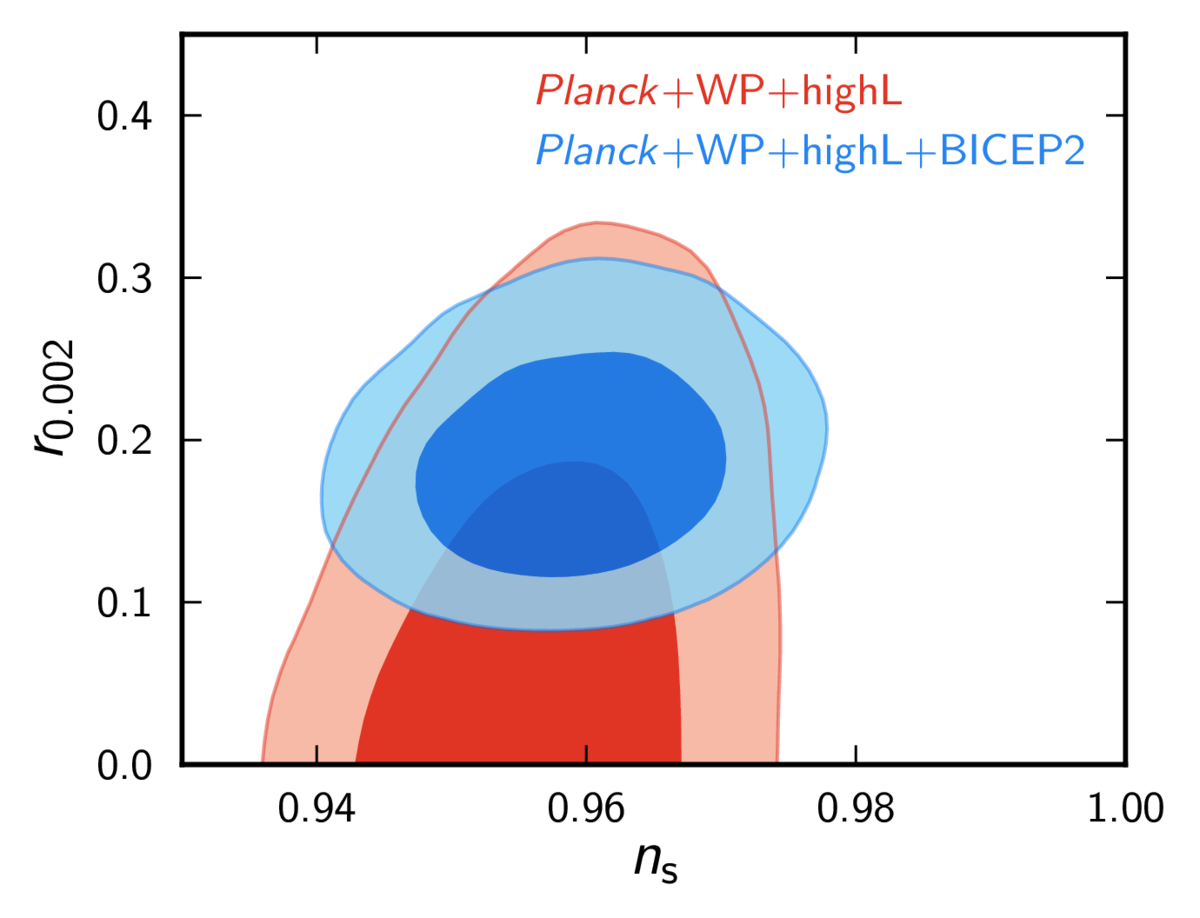There is nothing like the amazing news that was announced today at the Harvard-Smithsonian Center for Astrophysics in Boston to restart this blog after one-month silence. Researchers from the BICEP2 collaboration organized a press release that was supposed to be broadcast live. However, and this already tells something about the expectation mounting around the event, too many people tried to watch the streaming, the Harvard server collapsed and was unable to broadcast the event live. It was a great pity for me that I left the institute 2 days ago to come back to Lisbon, as for a couple of days I couldn't attend this historical event in person...
So what's all this hype about? The BICEP2 collaboration detected for the first time the primordial gravitational waves produced during the first instants of the Universe, right after (meaning something like 0.000000000000000000000000000001 seconds after) the Big Bang. This is going to be a historical discovery, for at least three reasons:
1) Gravitational waves are one of the main predictions of Einstein's General Relativity and they were still waiting for a direct detection. Evidence for gravitational waves come from the inspiral of a binary system, whose orbit shrinks because of the emission of gravitational waves. Scientists have observed the shrinking of the orbit (an observation that was awarded the Nobel Prize in 1993) but did not detect the emitted gravitational waves directly. Actually, not even the BICEP2 experiment detects primordial gravitational waves directly, but it can detect their effect on the CMB, which is somehow more direct (or, if you wish, less indirect) than what is now routinely done with binary pulsars. [Actually, I'm having an ongoing discussion with various colleagues about what a direct detection actually is. This discussion can easily becomes philosophical and I'd rather skip it here... I'll just tell you that this detection is definitely the most direct evidence of gravitational waves that we have so far]. Most importantly, the gravitational waves detected by BICEP2 are totally different from those emitted by neutron stars and black holes. Thus, this result can be seen as yet another confirmation of Einstein's gravity in a region which was completely unexplored to date.
2) Primordial gravitational waves need to be enormously amplified if they are to be detected at the present epoch (remember they were produced some 14 billions years ago...). Essentially, the majority of scientists believe that the only mechanism to explain such amplification is cosmological inflation. For this reason, today's results are often quoted as the first evidence for inflation, something that cosmologists and particle physicists were after since the late 70s. In very few and simple words, the theory of inflation assumes that the Universe has undergone a phase transition right after the Big Bang, in which it started expanding exponentially for an extremely short time (10^{-32} seconds). This exponential growth was predicted to explain other characteristics of the Universe that were already observed in the past, like its flatness, homogeneity and isotropy. Essentially, inflation provides a dynamical mechanism that, starting from generic initial conditions, makes the universe homogeneous and isotropic right to the level that we know observe.
3) Had enough? No, there's even more. Gravitational waves and inflation alone are not enough to explain why an experiment like BICEP2 would today detect such signal. Indeed, intrinsic with the idea of inflation is that fact that such spacetime perturbations were produced by quantum effects. The energy scale of such effects (some 10^16 GeV) is way larger than the energy currently produced in particle accelerators (and most likely larger than the energy that we could ever produce on Earth!) Therefore, the very fact that we can detect such effect and make sense of it (in fact, these results seem to favor one of the simplest theories of inflation, which was proposed back in the 80s) is already a confirmation of the quantum nature of gravity, whose fully understanding is the Holy Grail of all theoretical physics.
What's next? As one of the spokesmen of BICEP put it during the press release: "an exceptional discovery requires exceptional confirmation". Likely enough, these outstanding results could be confirmed soon by the Planck collaboration and by other experiments that are measuring the properties of the CMB. If confirmed, not only they would ease the decision for one of the next Nobel prizes in Physics, but they would immediately open a new era in cosmology, gravity and even particle physics.
Added: this is the reaction of Andrei Linde, one of the fathers of the theory of inflation (and indeed the scientist who proposed the theory that it seems now favored by BICEP2 data):
Hilarious!



No comments:
Post a Comment